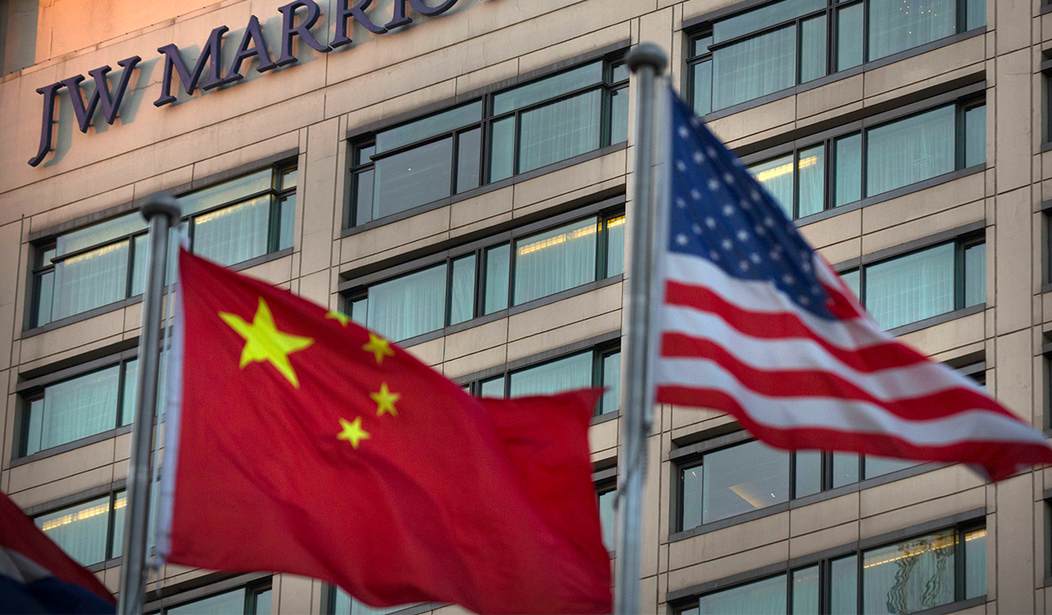While the media has breathlessly fixated on President Trump’s aggressive actions to reorder the global trading system, far fewer headlines have accompanied the closely related fight in Congress over the future of America’s wireless spectrum policy. That’s a shame, because both debates turn on the same high-stakes question: how the United States can preserve its global economic and military supremacy in the face of a rising threat from China.
The spectrum fight on Capitol Hill pits the cellular industry against military leaders and congressional defense hawks including Rep. Mike Rogers (R-AL), Sen. Deb Fischer (R-NE), and Sen. Mike Rounds (R-SD). The phone companies want Congress to clear wireless military systems – such as radars, radio systems, and satellite links – out of prime spectrum real estate and auction those frequency bands off for the carriers’ exclusive commercial use. They frame spectrum allocation as its own geopolitical competition, warning loudly that the U.S. is falling behind China in the race to allocate bandwidth for 5G and 6G.
Big Cellular’s spectrum alarmism, however, gets the argument completely backwards. Stripping the Defense Department of key spectrum holdings would be a devastating setback to America’s national security. In the best-case scenario, it would still cost taxpayers at least $250 billion and take national defense agencies 10 to 20 years to re-engineer and redeploy their current systems to new frequency bands. More problematically, some new capabilities – including, critically, President Trump’s promised “Golden Dome” missile defense system – might not work at all.
General Gregory Guillot, the commander of U.S. Northern Command and NORAD, was unequivocal on that point in a pair of recent appearances on Capitol Hill. “To properly employ all those systems, we would have to have uninterrupted and complete access to the entire spectrum,” Guillot told a Senate hearing in February. “Almost all of the systems that we use for homeland defense rely on that part of the spectrum that’s being considered to be either sold or shared,” he added at a House hearing earlier this month.
Recommended
In other words, the Cellular lobby’s spectrum wish list would come at the cost of blinding the Golden Dome’s tracking and targeting radars. There’s no conceivable world in which that trade-off helps America win a global power struggle with China.
In fact, the cellular industry’s feigned concern over “losing the 5G race to China” is equally nonsensical. It’s hardly surprising that China’s authoritarian government prefers allocating its domestic spectrum to centralized, exclusive-license frameworks like 5G rather than open, permissionless frameworks like Wi-Fi. Exclusive licensing limits Chinese spectrum use to a small handful of state-affiliated national carriers, run by regime-aligned executives fully committed to Beijing’s monitoring and surveillance diktats, purchasing network equipment from regime-backed manufacturers Huawei and ZTE.
Beijing then looks to further expand its manufacturers’ market share by lobbying other countries to adopt the Chinese spectrum allocation model. It’s basically one big export promotion scheme: While the U.S. has banned imports from Huawei and ZTE over concerns that the firms’ equipment could let China spy on Americans, we’ve only had mixed success convincing our allies to follow suit. So Huawei remains the global market leader – and their market share would only grow if the U.S. adopts China’s spectrum playbook, causing other countries to follow suit.
But while it’s easy to understand Beijing’s spectrum strategy, it’s baffling that some on Capitol Hill want the U.S. to follow their lead. An “America First” spectrum strategy should double down on frameworks like Wi-Fi and CBRS whose equipment markets are dominated by American companies like Cisco, HPE, Intel, and Broadcom – not chase China’s tail in pursuing spectrum policies that will only expand Huawei and ZTE’s global market share.
We’ll never “beat China” by letting Cellular industry lobbyists goad politicians into blindly embracing a “race” with China set on Beijing’s terms. Instead of letting China dictate the rules of the game, American policymakers instead must demand a spectrum strategy rooted in America’s needs and interests – one that clearly aligns with the goals of President Trump’s America First agenda to Keep America Safe.

























Join the conversation as a VIP Member